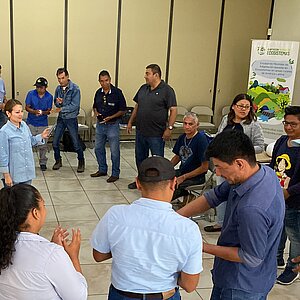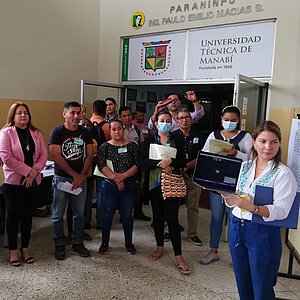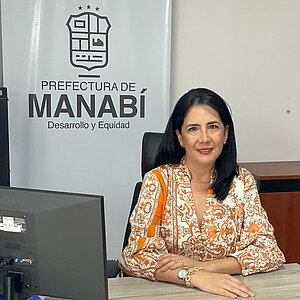Rescuing biodiversity with traditional knowledge and sustainable innovations

An IKI project has connected 13 women across Latin America who are taking leadership roles in EbA – one of them is María Cristina Par Tuluxan, who is leading changes in a Quiché community in Guatemala.
The negative impacts effects of climate change and biodiversity loss continue to disproportionately affect women. In the midst of this crisis, however, there are stories of women who are working to conserve biodiversity and advocate for a resilient and sustainable future. The IKI project “Scaling-up ecosystem-based adaptation (EbA) measures in rural Latin America” aims to mainstream innovative and gender-responsive EbA measures on a larger scale. A key success factor for scaling up is sharing knowledge to enable people to increase their resilience to the impacts of climate change, while protecting the ecosystems on which they depend. The project has connected 13 women across Latin America, from Mexico to Bolivia, who are taking on leadership roles in EbA in their local communities, one of them is María Cristina, a leader from Quiché, Guatemala.
The story of María Cristina from Quiché, Guatemala

Santa Cruz de Quiché, as part of the so-called ’Central American Dry Corridor’, experiences prolonged of drought periods that reduce agricultural production, especially of staple crops like maize and beans, which are essential to the local diet. The impact of climate change and biodiversity loss are exacerbating the situation, leading to the disappearance of medicinal plants and various food sources in the community. These situations particularly affect Quiché women because of their responsibilities for subsistence agriculture, food security, and family care.
María Cristina is a Mayan quiché farmer from the municipality of Santa Cruz de Quiché, Guatemala. She is 39 years old and has four children. Her passion for learning led her to seek training in sustainable agricultural practices, combine this knowledge with what she had inherited from her ancestors, and eventually become a promoter in her community. She has carried out this work with organisations such as the Rural Development Learning Centre, the Municipal Commission for Food and Nutrition Security, and the Municipal Office for Women.
Faced with rising prices for staple foods, caused by frequent droughts over the past 10 years, María Cristina set out to overcome the economic challenges, and she did so from a special place: caring for the land and improving production.
With the support of the Ministry of Agriculture, Livestock, and Food, she learned about the importance of using available resources and adapting her production methods. This led her to revalue Ütz Ab’ix (good milpa)—an ancestral system that shares characteristics of agroforestry and uses local biodiversity—and combine it with sustainable technological innovations. Seeing improvements in soil conservation and native species, she decided to dedicate herself to sharing her knowledge.
Trainings for 60 women led to a higher and sustainable productivity

Since 2012, María Cristina has led trainings for 60 women dedicated to facing the challenges of climate change by improving their agricultural practices. The women learnt about adaptation and environmental protection strategies, such as preparing organic fertilizers, composting crop residues, and selecting the best seeds for more resilient crop cycles. María Cristina also realised ecological restoration with elderberry sprouts in cornfields and installed handmade drip irrigation systems using recycled plastic bottles. Through the implementation of windbreaks and irrigation channels, she was able to manage water use, protect crops, reduce erosion, and promote crop growth.
Over the past years Maria Cristina taught the women of the community to implement sustainable agricultural practices, advertise their organic products in nearby markets, and have access to food and medicinal plants all year round. The implemented crop diversification and marketing initiatives have improved local economic development. The production levels of organic crops have improved through the combination of sustainable agricultural techniques with ancestral knowledge.

As a promoter, I encourage other women in Guatemala and across Latin America to persevere and get involved in biodiversity restoration and the fight against climate change. I tell them that it is possible, even if there are barriers and diverse climates. Despite the challenges, there is a future if we work with effort and determination.
Get to know other women with EbA leadership roles
You can read the stories of the other EbA women leaders in the interactive presentation "Biodiversity loss and climate change are also a gender issue", available in the IKI Media Library.
The link has been copied to the clipboard
Contact
IKI Office
Zukunft – Umwelt – Gesellschaft (ZUG) gGmbH
Stresemannstraße 69-71
10963 Berlin












